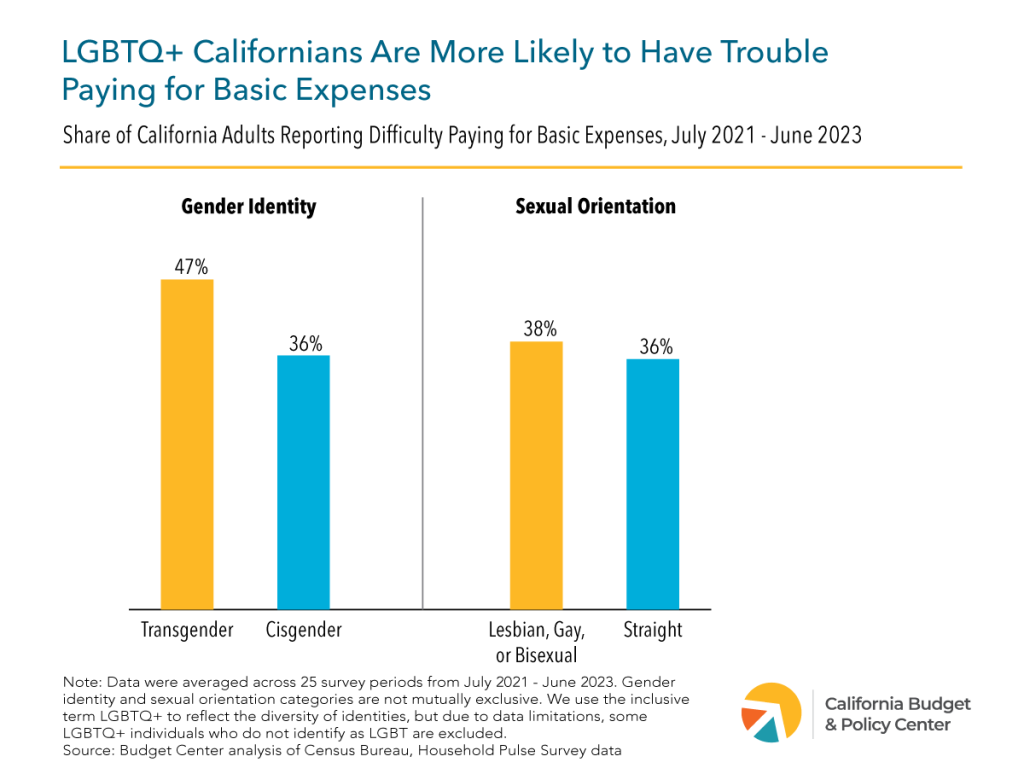California should be a place where everyone — regardless of gender identity or sexual orientation — can afford to support themselves and their families. Many Californians struggle with the high costs of living in the state. They face uncertainty over whether they will be able to make their next housing payment, keep enough food on the table, and pay for their health expenses.
LGBTQ+ Californians — who make up about 1 in 10 adults in the state — are more likely than other Californians to have a hard time covering the basics. Around 2 in 5 LGBTQ+ adults in the state had difficulty paying for usual household expenses, according to data from the US Census Bureau’s Household Pulse Survey collected between July 2021 and June 2023.1Based on Budget Center analysis of Household Pulse Survey data. These data likely exclude some LGBTQ+ Californians since they do not allow for the clear identification of other non-cisgender, non-straight identities such as nonbinary, two-spirit, pansexual, and asexual. See notes on the limitations of the Household Pulse Survey data in Kayla Kitson and Adriana Ramos-Yamamoto, State Leaders Should Prioritize LGBTQ+ Californians’ Mental Health (California Budget & Policy Center: May 2022). Broken down by gender identity and sexual orientation, about 47% of transgender Californians and 38% of lesbian, gay, or bisexual Californians had difficulty covering their expenses.2Note that LGBTQ+ gender identity and sexual orientation categories are not mutually exclusive; for example, transgender individuals may identify as lesbian, gay, bisexual, or straight.

Barriers to Economic Stability
Many LGBTQ+ people face barriers to economic stability, including employment and housing discrimination, a lack of family support, and mental health concerns.3Harvard T.H. Chan School of Public Health, Robert Wood Johnson Foundation, and National Public Radio, Discrimination in America: Experiences and Views of LGBTQ Americans (November 2017), 1; Kitson and Ramos-Yamamoto, State Leaders Should Prioritize LGBTQ+ Californians’ Mental Health. And while California is far ahead of many other states in enacting legal protections for LGBTQ+ individuals and families, the degree of social acceptance of LGBTQ+ people varies across the state, which likely impacts their economic as well as social well-being.4“Snapshot: LGBTQ Equality By State,” Movement Advancement Project (webpage), accessed March 31, 2023 ; The Williams Institute, The LGBT Divide in California: A look at the socioeconomic well-being of LGBT people in California (June 2015).
Other intersecting identities — such as race and ethnicity, age, and ability — may make some LGBTQ+ people more susceptible to financial insecurity. For example, LGBTQ+ Californians of color are more likely to face barriers to economic security than both white LGBTQ+ Californians and non-LGBTQ+ Californians of color. LGBTQ+ youth and young adults are more likely to experience homelessness due to an unaccepting family environment, which can result in lasting adverse health, educational, and economic outcomes.5“LGBTQ+,” youth.gov (webpage), accessed March 31, 2023.
Inclusive Policies for LGBTQ+ Californians
State leaders should ensure that policies aiming to reduce economic hardship take into account the unique challenges faced by LGBTQ+ Californians and that supports are available and accessible to address the needs of these communities. Policymakers at all levels of government should also take steps to improve data collection methods to make sure that LGBTQ+ individuals — and the many identities underneath the LGBTQ+ umbrella — are represented. Having reliable and accurate data on the challenges that different LGBTQ+ communities are facing is vital in order to inform the most effective policy solutions to address these challenges.


